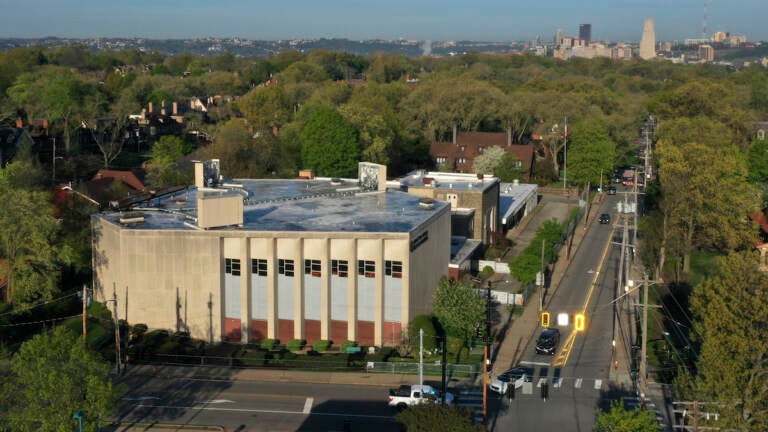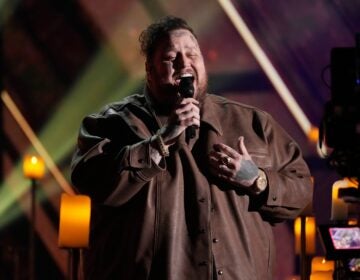Prosecutor: Gunman in Pittsburgh synagogue massacre harbored ‘malice and hate’ for Jews
The federal trial of Robert Bowers comes four and a half years after the shooting deaths of 11 worshipers from three congregations meeting at the Tree of Life synagogue.

File photo: The Tree of Life Synagogue (lower left) stands in the Squirrel Hill neighborhood of Pittsburgh on Thursday, April 19, 2023. (AP Photo/Gene J. Puskar, File)
Prosecutors on Tuesday described how a heavily armed suspect barged into a Pittsburgh synagogue and shot every worshipper he could find in the deadliest antisemitic attack in U.S. history.
Robert Bowers’ federal trial got underway more than four years after the shooting deaths of 11 worshippers at the Tree of Life synagogue.
Twelve jurors and six alternates — chosen Thursday after more than 200 candidates were questioned over a month — are hearing the case. They include 11 women and seven men.
“The depths of the defendant’s malice and hate can only be proven in the broken bodies” of the victims and “his hateful words,” Assistant U.S. Attorney Soo C. Song said during her opening statement.
Some of the survivors dabbed tears, while Bowers, seated at the defense table, showed no reaction.
The defense was expected to present its opening statement before the prosecution began calling witnesses.
Bowers, 50, could face the death penalty if convicted of some of the 63 counts he faces in the Oct. 27, 2018, attack, which claimed the lives of worshippers from three congregations who were sharing the building, Dor Hadash, New Light and Tree of Life. Charges include 11 counts each of obstruction of free exercise of religion resulting in death and hate crimes resulting in death.
Members of the three congregations arrived at the courthouse in a school bus and entered together.
Prosecutors have said Bowers made antisemitic comments at the scene of the attack and online.
In proceedings before and during juror questioning, the defense has done little to cast doubt on whether Bowers was the gunman and has instead focused on preventing his execution.
Bowers, a truck driver from the Pittsburgh suburb of Baldwin, had offered to plead guilty in return for a life sentence, but federal prosecutors turned him down. Bowers’ attorneys also recently said he has schizophrenia and brain impairments.
As an indication that the guilt-or-innocence phase of the trial seems almost a foregone conclusion, Bowers’ lawyers spent little time during jury selection asking how potential jurors would come to a verdict.
Instead, they focused on the penalty phase and how jurors would decide whether to impose the death penalty in a case of a man charged with hate-motivated killings in a house of worship. The defense probed whether potential jurors could consider factors such as mental illness or a difficult childhood.
The families of those killed are divided over whether the government should pursue the death penalty, but most have voiced support for it.
The trial is taking place in the downtown Pittsburgh courthouse of the U.S. District Court for Western Pennsylvania, presided over by Judge Robert Colville, an appointee of former President Donald Trump.
Prosecutors are expected to tell jurors about incriminatory statements Bowers allegedly made to investigators, an online trail of antisemitic statements that they say shows the attack was motivated by religious hatred, and the guns recovered from him at the crime scene, where police shot Bowers three times before he surrendered.
They indicated in court filings that they might introduce autopsy records and 911 recordings during the trial, including recordings of two calls from victims who were subsequently shot to death. They have said their evidence includes a Colt AR-15 rifle, three Glock .357 handguns and hundreds of cartridge cases, bullets and bullet fragments.
Bowers also injured seven people, including five police officers who responded to the scene, investigators said.
In a filing earlier this year, prosecutors said Bowers “harbored deep, murderous animosity towards all Jewish people.” They said he also expressed hatred for HIAS, founded as the Hebrew Immigrant Aid Society, a nonprofit humanitarian group that helps refugees and asylum seekers.
Prosecutors wrote in a court filing that Bowers had nearly 400 followers on his Gab social media account “to whom he promoted his antisemitic views and calls to violence against Jews.”
The three congregations have spoken out against antisemitism and other forms of bigotry since the attack. The Tree of Life congregation also is working with partners on plans to overhaul its current structure, which still stands but has been closed since the shootings, by creating a complex that would house a sanctuary, museum, memorial and center for fighting antisemitism.
The death penalty trial is proceeding three years after now-President Joe Biden said during his 2020 campaign that he would work to end capital punishment at the federal level and in states that still use it. His attorney general, Merrick Garland, has temporarily paused executions to review policies and procedures, but federal prosecutors continue to vigorously work to uphold death sentences that have been issued and, in some cases, to pursue new death sentences at trial.
WHYY is your source for fact-based, in-depth journalism and information. As a nonprofit organization, we rely on financial support from readers like you. Please give today.






